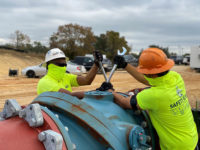Phoenix city officials have passed a new ordinance aimed at protecting workers for city contractors from the dangers of extreme heat. The move comes after a summer in which the city experienced a record-breaking 31 straight days with temperatures over 110 degrees and the Maricopa County Health Department reported 340 heat-related deaths.
The ordinance will require contractors to provide outdoor workers with access to water, rest, shade and safety training. Contractors will also be required to create and maintain a heat safety plan. The Phoenix City Council passed the ordinance unanimously following a citywide campaign that included members of SEIU, UNITE HERE Local 11 and other labor and community organizations.
Workers for city contractors, including subcontractors, who provide construction, engineering, airport and other services to the city will now be covered by the new protections. This includes workers at Sky Harbor Airport, where extreme heat is a major concern.
“The heat at Sky Harbor Airport is dangerous and all of us who work there know it,” said Cecilia Ortiz, a passenger service agent at the airport. Ortiz filed a heat complaint against airport contractor Prospect last summer. “We’re glad the city of Phoenix is stepping up to require that airlines and their contractors give us basic heat protections outdoors and in the jet bridges. Now we need to keep pushing to make sure cabin cleaners, who work inside planes but often with the A/C off, are also protected. And we are going to hold our employers accountable. They must take this ordinance seriously, so we can stay safe at work.”
Ortiz is part of a worker-led campaign supported by SEIU to win a voice on the job for Phoenix airport service workers.
The new ordinance is a “critical first step” to protecting workers for city of Phoenix contractors, according to leaders at the National Council for Occupational Safety and Health (National COSH).
“People who work outside and in hot indoor environments in Phoenix suffer unacceptably during our deadly summers, with too few protections,” said Katelyn Parady, a Phoenix-based worker health and safety expert with National COSH. “This ordinance is a critical first step toward getting workers lifesaving protections and holding employers accountable for safety during heat season. It’s also a model for how local governments can leverage their contracts to protect the workers who keep their communities running from climate change dangers.”
Parady assisted local workers and unions in advocating for the new protections. She says it’s well documented that the dangers of extreme heat disproportionately impact Black, Brown and low-income workers.
Latinx/Hispanic workers, for example, are three times more likely to die from heat stress than their peers, according to data from the National Institute for Occupational Safety and Health.
Three out of four heat-related deaths in Maricopa County in 2023 took place outdoors, but the county does not provide data about how many fatalities were work-related.
The new ordinance will be life-changing for workers like Filiberto Lares, who delivers food to airplanes for LSG Sky Chefs.
“This heat safety ordinance will change my life and the lives of my coworkers at LSG Sky Chefs,” said Lares. “We can spend hours on the tarmac delivering food to the airplanes. In the summers, when the temperatures reach extremes, the asphalt on the tarmac is even hotter. It has felt as though people forget that many of us work in vehicles. Having air conditioning in work trucks, buses, and delivery vans matters just as much as in a building because those vehicles are our workplaces.”
Under the new ordinance, contractors will be required to provide access to air conditioning in vehicles with enclosed cabs.
Now, as Phoenix looks to a future with even hotter summers, Parady says it’s important to expand protections to cover all workers, not just those employed by city contractors.
“Your body’s ability to cope with extreme heat does not depend on whether you work for a city contractor, directly for the city or for a private employer,” said Parady. “We’re going to keep organizing until all workers have strong protection from heat – because everyone works under the same blazing sun.”
Sources:
National COSH
United States Department of Labor
Maricopa County Health Department



